#pseudonym
Text
“My love and I took hands and swore, against the world, to be poets and lovers evermore,”
- Katherine Bradley and Edith Cooper (Michael Field), ‘It was deep April’
#wlw poetry#pseudonym#lesbian poetry#queer poems#literature#poem#poetry#classic literature#books#quotes#english literature#spilled thoughts#web weaving#words#chaotic academia#spilled ink#typography#academia aesthetic#art#classic academia#cottage academia#dark academia poetry#quotation#spilled poetry#queer joy#dark acadamia aesthetic#lgbtq books#books and literature#dark academia
262 notes
·
View notes
Text
Don't share anyone's pseudonym.
I have to change one of my professional pen names because a friend I thought I could trust, one of only two people not in publishing who knows, blabbed to her writing group that the nom de plume is me.
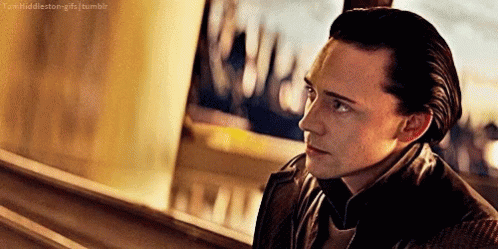
This pseudonym is one I've only used for short stories. But I was going to use it for an new novel. But now I have to change it. Thank god we hadn't gotten any further in the process, because if it were already being printed I'd be stuck with the present pseud.
If someone entrusts you with their pen name it's because they trust you to keep it to yourself.
It doesn't matter if you think it's not a big deal to tell others. There are many reasons writers use a pseudonym. Some are commercial, some are very personal. In fanfics it may be the author is under 18 and doesn't want family to know she writes sex scenes.
When a writer has published under a pseud, that name becomes their brand. They don't want to have to change it.
If someone asks you to not tell anyone else, do this:

If you're a writer who uses a pseudonym, the safest bet is to tell no one. I know it sucks to not be able to show someone a story/fic and say "I wrote this!" But if you felt you needed a pseud in the first place, the safest secret is one never told.
I have three other pen names, each for a different genre, one for fanfics. Only my dearest best friend of 22 years, who's my first editor, knows their mine.
Now I have to come up with a new pseudonym. And that ain't easy! Especially when it will/might end up on the cover of my book.
BTW, if you're choosing a pseud, pick one whose surname begins with M. That'll give you a good spot on library and bookshelves.
#writblr#writers on tumblr#writing community#writerscommunity#writing#writer#writers#writer problems#writing problems#pseudonym#traditional publishing#pen name#nom de plume
33 notes
·
View notes
Text
I was at a camp and we all had to pick pseudonyms, but once we picked them we wouldn't remember picking them and my chosen name was Polyamory. They served us our coffee (and they just magically knew our orders) and mine was just hot chocolate in a Ziploc bag.
733 notes
·
View notes
Text
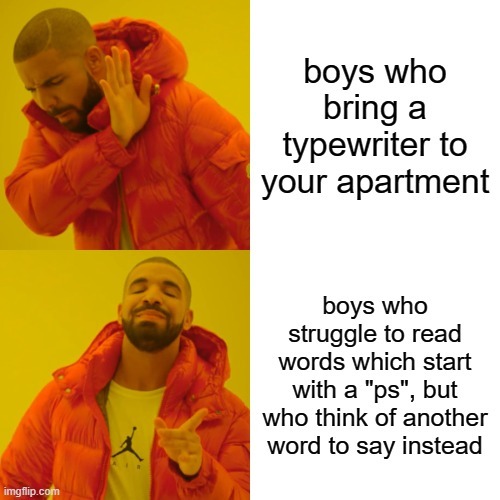

Travis Kelce is the Tortured Poet we deserve. #upgrade
#travis kelce#the tortured poets department#he who must not be named#maybe that is confusing in this context as i usually post a lot about harry potter#ttpd#new heights#jason kelce#words#litany#myriad#upgrade#for the record this is obviously said with affection and amusement because he is clearly fine with his brother teasing him#plus he has three super bowls so seriously who cares how good his reading is#my guy#tayvis#taylor swift#pseudonym
14 notes
·
View notes
Text
By: Catherine Hawkins
Published: May 6, 2023
In a new piece for Scientific American, Princeton anthropologist Dr. Agustín Fuentes argues that the binary of male and female is too simplistic to describe the complexity of human sex. He claims that defining sex from “the type of gamete (sperm or ova) [an organism] has the function of producing” is not just “bad science,” but a political ploy to justify discrimination. Instead, he says we should think of sex as a combination of many biological and social characteristics that make it “dynamic, biological, cultural, and enmeshed in feedback cycles with our environments, ecologies, and multiple physiological and social processes.” Definitions are human inventions and can certainly change to incorporate new understanding.
Unfortunately, this definition of sex is muddled and incoherent. Making gametes just one of many characteristics defining sex may free us from a politically unpopular binary, but at the cost of our ability to describe reality correctly and clearly.
What is this supposedly simplistic, regressive gamete-based definition of sex? Gametes are the cells that combine during sexual reproduction to produce an offspring with genetic material from both parents. Each species that sexually reproduces needs to produce two kinds—small, mobile gametes (sperm) that make their way to large, immobile gametes (eggs). Most animals have evolved two basic body plans to produce these gametes and use them to give rise to offspring. Dr. Fuentes is correct that these body plans are complex and involve many aspects of anatomy, physiology, and behavior. For example, for human females, successfully producing eggs, getting them into contact with sperm, and generating viable offspring requires dedicated structures (including a vagina, ovaries, and uterus), complicated hormonal regulation (including puberty, the menstrual cycle, and the many hormonal changes during pregnancy, birth, and lactation), and complex biologically and socially influenced behaviors.
In the gamete-based view, the question “what sex is this person?” is asking “Which body plan would this person use to reproduce? The female (egg-based) or male (sperm-based) plan?” Humans do not have other sexes beyond males and females because there are no other gametes that human bodies have evolved to use for reproduction. Sometimes, the complex machinery involved in reproduction can develop wrong, and people can suffer from infertility or exhibit reproductive traits that are atypical for their sex, including ambiguous genitalia (intersex conditions). However, as pointed out by others, these are not additional sexes because these body plans do not produce a new type of gamete besides sperm or eggs. Someone who does not produce any gametes would also not be a third sex since they would be fundamentally incapable of sexual reproduction.
Dr. Fuentes challenges this view by building and readily destroying several strawmen. He claims that sex in human cannot be binary because (1) sex differences in physiology and behavior are not universal across species, (2) individuals with the same gametes can have different traits, and (3) individuals with different gametes can have overlapping traits. To the first point, the gamete-based view is what allows us to talk coherently about sexes across diverse organisms. We know that what a female echidna and a female human have in common is that they produce eggs that must be fertilized by sperm to reproduce. Is Dr. Fuentes saying that if we were to use his mishmash of “biological and social characteristics” to define sex, we would end up with bizarre situations where sperm-producing individuals are the “females” of some species?
The second point also falls quickly to scrutiny. There is no mainstream belief that the fact there are two body plans for reproduction means that every characteristic of individuals with those body plans must be the same. As Dr. Fuentes reminds us, “producing ova or sperm does not tell us everything (or even most things) biologically or socially” about people, including characteristics like “sexual attractions, interest in literature, engineering and math capabilities” or “love of… sports.” Just imagine a world where that was a mainstream belief. Going to the doctor would be chaos if doctors believed that there was only one acceptable body size, estrogen or testosterone level, or muscle or fat composition for each sex. Imagine being regularly shocked to meet gay males, male English teachers, and female engineers and Red Socks fans. Obviously, we don’t live in this world, because there is nothing incompatible about believing that individuals who produce the same gametes and use the same general body plan to produce offspring can vary widely in many characteristics.
Dr. Fuentes’ third and final strawman is also the basis of the “sex is a spectrum” argument, usually represented in a graph like this:
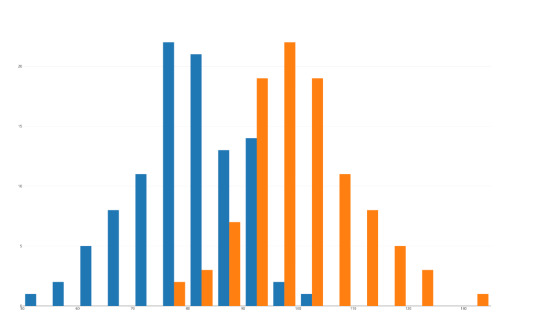
Despite detailed rebuttals, it’s obvious from this graph that people cannot be grouped into binary categories of male and female because these categories are not separate—some of the people who produce eggs have more male-typical traits, and vice versa.
Except, oops, that’s a plot of dog and horse body weights.

The fact that small horses and large dogs have similar weights means that “horse” and “dog” are a false binary, and all of these animals fall along a dog-horse spectrum. Don’t scoop me before I get this submitted to Nature.
Alright, I was a bit rude just there to Dr. Fuentes. Let’s be fair and ask: what would be so wrong with taking up his definition of sex as a conglomerate of physical and behavioral traits, of which gamete type is just one? For his definition to work, we would first need to agree on what physical and behavioral traits we must use to quantify sex—otherwise, we will get different answers about where a person falls on the spectrum. This gets tricky fast for behavioral traits. For example, can we determine sex by asking people about their interest in literature in general, or would we need to distinguish an interest in rugged war stories by Hemmingway from romantic comedies of manners by Austen?
Let’s say we eventually did decide on a comprehensive panel of traits to measure human sex. We then quickly see that his definition is not so much unscientific as it as a kind of anti-science that makes biology less capable of making sense of the world around us. For example, people who produce eggs typically have hormone levels that change over time as part of their menstrual cycle. In the gamete-based view, this person is always female, because they will always use eggs to reproduce. But if hormone levels are instead some of the physical traits that define one’s sex, this definition quickly devolves into nonsense where people become “maler” and “femaler” every month while their underlying reproductive body plan remains the same.
Even measuring sex for an individual with ambiguous traits—which should be a strong case for Dr. Fuentes’ definition—quickly breaks down into gibberish. Consider a person who produces eggs but has the rare disorder called congenital adrenal hyperplasia (CAH). CAH causes the adrenal glands to overproduce androgens, the hormones that drive the development of male-typical characteristics. This person would have ovaries and a uterus but also likely have ambiguous external genitalia, an irregular menstrual cycle, and significant facial and body hair, falling well within the overlapping zone for physical traits. But what is their sex? In the gamete-based view they are unambiguously female, since this person would only ever reproduce through producing eggs and never by producing sperm or another yet-to-be-discovered gamete. This person could struggle to get pregnant due to CAH, but this doesn’t change the fact that their only viable reproductive strategy is female (through eggs). Instead, Dr. Fuentes’ view of sex would say that this person has traits that place them in the middle of the range across humans, making them approximately 50/50 male- and female-typical.
The problem is that this information is essentially useless. Imagine reading that as a doctor and trying to figure out whether your patient is a female facing serious medical problems or a healthy short male who likes gossiping and Pride and Prejudice more than sports. The doctor would need the gamete-based view of sex to make sense of what they’re seeing, since these traits—facial hair, high androgens—only emerge as symptoms in the context of a female sex.
How has a researcher at such a respected institution convinced himself of something so confused and incoherent? Since Dr. Fuentes has taken the liberty of speculating about others’ political motivations, I will speculate about his.
I believe Dr. Fuentes and other political progressives prefer this definition of sex because it makes it impossible to legally protect single-sex spaces. Take the case of Adam Graham (Isla Bryson), a male convicted of two rapes who began identifying as a woman and was sent to a female prison until public outcry reversed this decision. The gamete-based view is clear that Graham was born a male and no amount of hormone therapy, interest in Jane Eyre, or disinterest in football can make him less so. There is therefore no biological reason to think that he would be less of a risk to female prisoners than any other violent male. But in Dr. Fuentes’ view, who’s to say that Graham couldn’t come up with enough physical and behavioral changes to move himself into the female-typical end of the spectrum? And if sex is just a position along a spectrum, how can anyone say that Graham couldn’t become “female enough” for female prison?
Maybe I’m putting words in Dr. Fuentes’ mouth, but I believe these are the kinds of extreme political positions that he and other activists are trying to re-write biology to support.
Dr. Fuentes, vote for anyone or anything you like. But leave biology out of your political project. Some of us would still like to use it to make sense of the natural world.
Catherine Hawkins (a pseudonym) has a PhD in ecology and evolutionary biology, and is currently a professor of plant biology at an R1 university in the United States.
==
There was a time when people didn't know that the Earth was round and not the center of the universe. Now we do. And people who deny it are delusional.
But there was never a time when humans were confused about how to make a baby. Now people are lying and pretending that there's no way to figure it out. And being celebrated for it.
#Catherine Hawkins#pseudonym#biological dimorphism#sex is binary#sex binary#gametes#human biology#sex denialism#biology denial#gender ideology#queer theory#dimorphism#religion is a mental illness
86 notes
·
View notes
Text
I get all giddy when my mutuals on my writing account start mentioning me by my pen name, and I can't help but get the feeling the universe is treating me with a taste of what book!Henry got being called Edward/Hyde
#this also might be a trans thing but we don’t need to unpack ALL of that#henry jekyll#jekyll and hyde#edward hyde#robert louis stevenson#the strange case of dr jekyll and mr hyde#pen name#pseudonym#writing
14 notes
·
View notes
Text
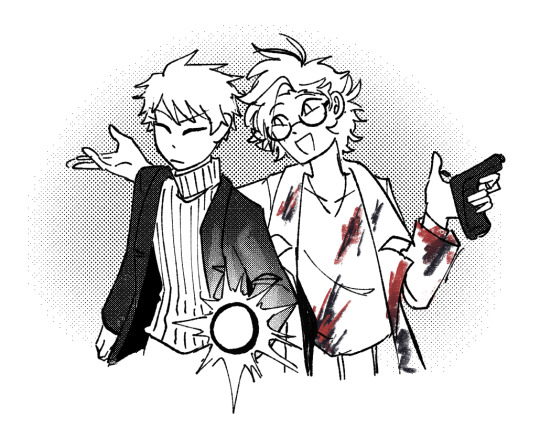
COEtober2023 Day 5: Inferno
#COEtober2023#cell of empireo#細胞神曲#세포신곡#haruki atou#aogu kanou#kanatou#day 5#inferno#aria draws#my art#inktober#inferno referring to the first part of the divine comedy#kanouatou#atoukanou#pseudonym
27 notes
·
View notes
Note
Whats DG stand for ?
DG is a pseudonym that I use to sign off my writings.
Hope this answers your question, even if only to a certain extent.
20 notes
·
View notes
Text

I found a new pseudonym
18 notes
·
View notes
Note
Obviously ignore this if you want but I saw you mention that you recently got published (congrats!!!) and I had a question. I'm still far out from that, but I know how to write and can research how to publish but I don't know how to market. Not only am I autistic and not charismatic, I want to solely use my pen name and distance my writing from my face because of my professional life. Do you know how to actually get people who might like your book to notice that it exists as an indie author with no previous following? Thank you if you have any advice!
Hello Moshke!
Thank you so much for the congratulations! It's taken longer than I expected but the realisation that I'm published is finally beginning to sink in! It's very surreal ^_^
I honestly don't know if I'm the right person to give advice on marketing as, at the moment, my book's been out just over a month and I feel like I'm stumbling around in the dark, but I wanted to give your ask due consideration and, despite my hesitation, I think I still have some tips that could hopefully help.
The reason I think I might have at least some relevant tidbits is that I'm also writing under a penname and most people don't seem to realise that.
Now, in my case, it's not about privacy it's just that don't like my given name enough to see it on book covers :D So I don't mind talking about it, but marketing your book under a penname isn't that much different to how you would market the book under your legal name.
Tip No. 1
Establish your pen name as a functional pseudonym now. Don't wait until you're ready to publish.
So, this stage was a little backwards for me. I come from the age of internet use where you did not give your real name online, under any circumstances, so I've always used various "online names".
By the time I decided that I was going to use "Arista Holmes" to publish under, anyone who knew me online already knew me as Ari. Even my best friend offline will sometimes call me Ari when we're chatting, so it had become as much an actual nickname as an online pseudonym.
But that's exactly what I'm getting at. I'm not pretending to be "Arista Holmes", I am Ari. A writer in her 30's based in the south east of England. The same way I'm Josie to my mum, or Jo-jo to my Godmother.
Tip No. 2
Don't think about it as marketing your book, but as creating an author "brand".
I'm using "Brand" here in the absence of a better term, because I absolutely hate thinking about this as a "brand", but what I mean is think of your Penname as something people will google search.
In fact, Google search your pen name.
As I mentioned, I'd been using "Arista Holmes" online for a while, and I had accounts all over the place that I didn't necessarily want coming up when people looked up my books.
(I will deny spending my youth on Neopets, it's just TOO embarrassing!)
But jokes aside; Google your pen name. See what comes up. Scroll through all 20, 30, 50 pages of google. Some asshole looking for some embarrassing post from your teen years won't stop at page five, and neither should you.
Shut down any accounts you find, or if you want to keep them, change the username to something else. The only non-publishing related account linked to Arista Holmes now is my AO3. I figure it's still writing, so no harm in leaving that one up.
Tip No. 3
Set up social media accounts now; Be as consistent as possible across all platforms.
Now, and I want to put this in big bold letters:
Having accounts on all the socials does not mean you will be active on all of them.
Or use them at all, in fact.
Having accounts on Facebook, Tumblr, Instagram, Twitter, Tiktok, Youtube, etc etc etc, just means that if, by some miracle, you make it big and draw in fans you'll also inevitably draw trolls and by making the account with your pen name; it stops them claiming that username and pretending to be you.
It's a form of pre-emptive protection.
On that note; Be consistent across your accounts. Use the same profile picture, use the same header or banner, use the same colour scheme, use the same "About Me/About Author" description, and (as much as possible) use the same username format.
That last one won't be possible on all platforms. Some of them don't like periods/full stops. Some don't like underscores, but try to be as consistent as possible.
For example my account on here is author.a.holmes, most other places I'm aristaholmes. I'd change it, but at this point, I don't want to break all my links.
Tip No. 4
Author Pictures Are Not Required.
I'm adding this point here because I mentioned profile pictures in the previous tip. Author Pictures Are Not Required.
Don't get me wrong, they're often highly encouraged, and I can't deny that they give a humanising effect to the author, but that doesn't mean you actually have to show your face.
I've chosen to put my face on my "About The Author" page in the back of my book, but that's a personal choice. You don't have to add one at all! It's only more recently that I've seen fiction author photos in the back of books.
Until about... 15 years ago? Ish? I wouldn't have expected to see an author photo unless the book was non-fiction.
If you want to add a picture of you, but don't feel comfortable or can't because of real world problems, consider an artist's caricature instead. Go one step further than a pen-name and give yourself a pen-picture! Jenna Moreci uses an artist's interpretation as her profile picture/logo, and Lemony Snicket only had pictures of the back of his head for ages.
If you do decide to commission an artist though, do explain to them that it will be included in your books, that you'll be selling, as they will probably want to add a commercial licence price to the artwork; But if you explain why you're having the caricature done I imagine most artists would be very reasonable about it.
***
That's all my tips for setting up and marketing yourself, as the author, under a pen name... but I can already hear the voices in my head muttering that I've not really touched on how to get people to find you once you've set up the pen name, and the socials, and your website etc.
And it's because I personally think that if you're writing under a pen name you need to establish it as an entity in its own right before beginning to try marketing it.
So, moving on…
Tip No. 5
Find your place on the great, wide, interwebs...
I mentioned I'd been online as Arista Holmes for about 8-10 years prior to deciding to publish under this name, but once I did decide to publish I went and made all my author socials (just like I mentioned in Tip No. 3)
That was in 2020 and it was part experimentation, and part letting people find me. I knew I wasn't going to be able to keep up with multiple social media's, and I also knew I didn't WANT to, so I made the socials and I started posting on each platform and figuring out which platforms I liked. Which ones were easy to use, and which ones got me the most engagement with other people.
For me, this turned out to be Tumblr and Instagram. Twitter and Facebook are like graveyards for me, and Tiktok is only a little better, but your mileage may vary.
I cross post consistently with Tumblr, Instagram, because those are the places I get the most engagement... but I also maintain a blog on my website and any big pieces of news (such as asking for ARC readers, or publishing my book) gets posted across ALL platforms because, well, I live in hope that one day my tiktok will go viral lol.
But honestly, the multiple socials literally eat up so much of the time I could spend writing; I highly recommend picking two, three at most, and focusing on them.
But what do you post? I can almost hear you yelling <3
Tip No. 6
How to market when you're shy/introverted/not-charismatic/or any other thing you feel is holding you back.
You're going to want to throw something at me but lean on your strengths. It sounds so simple, and I know it's not, I'm sorry, but here's what I mean by that.
When I was still experimenting with all the socials to find the ones I liked, I stumbled across an image. I want to say it was here on tumblr but, honestly, I don't remember and at the time I was neck deep in every marketing and promotional blog or article I could find trying to figure this shit out.
It was called "The Periodic Table of Content Marketing".

I don't know why this helped me wrap my head around marketing, but it did.
I read over each of the types of marketing and I started getting idea's.
Ebooks... I'd heard about people doing reader magnets for newsletter lists.
Interviews... I've seen authors on podcasts. I'd seen people on tumblr interviewing their characters. I could do that.
Trends... What are popular tropes if not trends of the moment?
And I suddenly realised that this silly little graph was all the different types of marketing I could do, broken down simply, and laid out neatly, and I could pick and choose not only the bits I was comfortable doing, but the bits that I was confident with.
I'm never going to put my face on a tiktok video and lipsync to popular songs, but I could write a 12,000 words short story prequel to my series and make it exclusive to newsletter subscribers.
That was something I could do, because it leaned on my strengths; My writing.
Because I haven't said it yet, but two years ago I'd have described myself very similarly to you.
I'm not charismatic. While I'm not autistic, I am painfully introverted. I have severe social anxiety. I'm not funny, I can't talk with strangers casually or easily. Talking about my book more than once a week feels like I'm bragging or being pushy... But I can write.
So I started looking for opportunities to share my writing, and let it... not speak for itself, but let my words draw in the audience. It still took a bit of pushing on my part, I would look for tag games where the user had left an "Open Tag" and I'd hop on those and share some words.
This is part of the reason Tumblr is one of my favourite places to network with writers and readers, because the tag games let me share and tease content without having to push through my social anxiety all that hard.
It's a slower, organic, audience growth but it's definitely my preference.
The content I shared on here, produced to play tag games, I quickly realised that I could copy it onto a pretty image in canva, and share it on instagram easier than I could condense a paragraph into the twitter character limit, or make it look appealing on Facebook's janky system.
And the more writing I shared, the more people commented and followed. And the more they commented and followed, the easier it was to talk to them. And then I started getting asks. That was nerve wracking and sometimes they'll still sit there a couple of months before I can make myself answer them.
(Sorry Sleepy and Avra, if you're reading this! I'll reply soon, I promise!)
Have I gone off topic here? I kind of feel like I have but also... not really.
If you feel like your writing is your strength, lean on it. Let it do the heavy lifting for you. Show your hand with your words.
By the time I set up my mailing list and offered 'Whatever Happened To Madeline Hail?' for free, I got 12 people to sign up straight away. I don't know if that's a lot, but it was at least eight more than I was expecting.
When my book launched, I received 14 reviews, and sold 20 copies the first month. Again, I don't know if this is a lot, but it was a whole hecking lot more than I'd hoped for.
I don't know if I'm good at marketing, and maybe someone will reblog and reply to this with better advice, or tear apart what I've said, and if they do great! I really hope it helps you or someone else down the reblog chain because, as I said at the start, I'm really just stumbling around in the dark and hoping I somehow get it all to work out lol
But I do just have one more piece of advice, that isn't really my advice...
Tip No. 7
Fake it until you make it.
You're a writer. The beauty of the internet is that we have time to stop, and think about the words we're writing in response to someone.
I'm a shy, introvert, who doesn't know when to shut up when she gets started talking about writing (Or at least that's what it looks like based on the length of this post...)
But 99% of people I speak to online don't know I'm an introvert. They don't know that after sending an email I have to go back to bed for a few hours to recover my energy, or that I can't answer a phone without feeling nauseous for the rest of the day and it's because when I'm online I'm Arista Holmes, and I can write my responses in the same way I write my characters.
I'm not saying I'm not being me, I am, but I'm also being given the time and space to be the confident me I want to be, rather than the nervous wreck I actually am.
Write your socials, and market your book, as the you that you’d write if you were dropped into one of your own books.
Fake it until you make it.
Handy Resource List For Marketing:
Periodic Table of Content Marketing
Jenna Moreci's Youtube - I take her writing advice with a huge chunk of salt, but her marketing advice is top notch.
Bethany Atazedah Youtube - Co-wrote a Marketing For Authors Non-fiction series, but a lot of her youtube videos contain good, free, advice too.
Self-Publishing With Dale - If you want to market effectively, keeping on top of the current trends and changes in the market is important. Self Publishing with Dale is the best way I've found to do that; He really has his fingers on the pulse of the Self Publishing Market, and even if you're not publishing yet, checking out some of his videos can teach you loads about what to do, but more importantly, what NOT to do.
Michael Anderle's 20Bookto50k system - I didn't mention it as a tip but the BEST form of marketing a book is to write the next book. Michael Anderle talks about his theory that is you have 20 books published, your backlist of royalty income should net you around $50k a year. The hour and a half talk changed my whole marketing outlook and is why I'm focussed on a slow grown, more organically sourced, audience rather thank paid advertising.
Abbie Emmons Youtube - I'm not sure I should include Abbie in a list of marketing resources as she's often more about the writing side of the craft, but her videos have been invaluable to me, so she's just worth checking out in general.
#Ari Speaks#Arista Speaks#Ari Gives Advice#Ari is unqualified to give advice#Marketing#Marketing under a penname#Penname#Pen Name#Pseudonym#Content Marketing#Publishing#Self Publishing#Building An Audience#Growing An Audience#Writeblr#Writeblr Community#Writing#Writing Community#CW: Mental Health#CW: Social Anxiety#CW: Anxiety#TW: Mental Health#TW: Anxiety#TW: Social Anxiety#Ask#Ask Answered
48 notes
·
View notes
Text

9 notes
·
View notes
Text
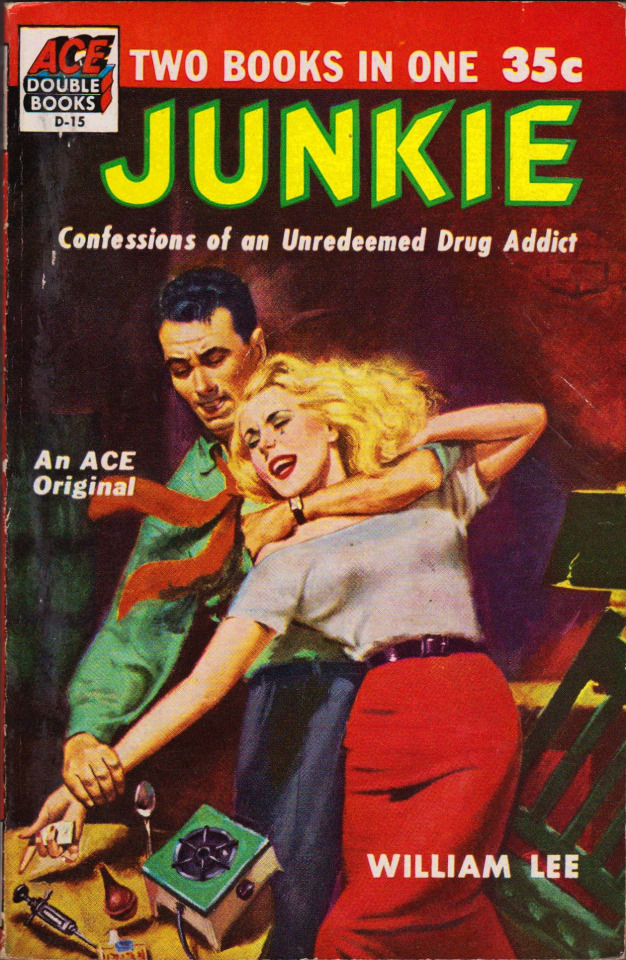
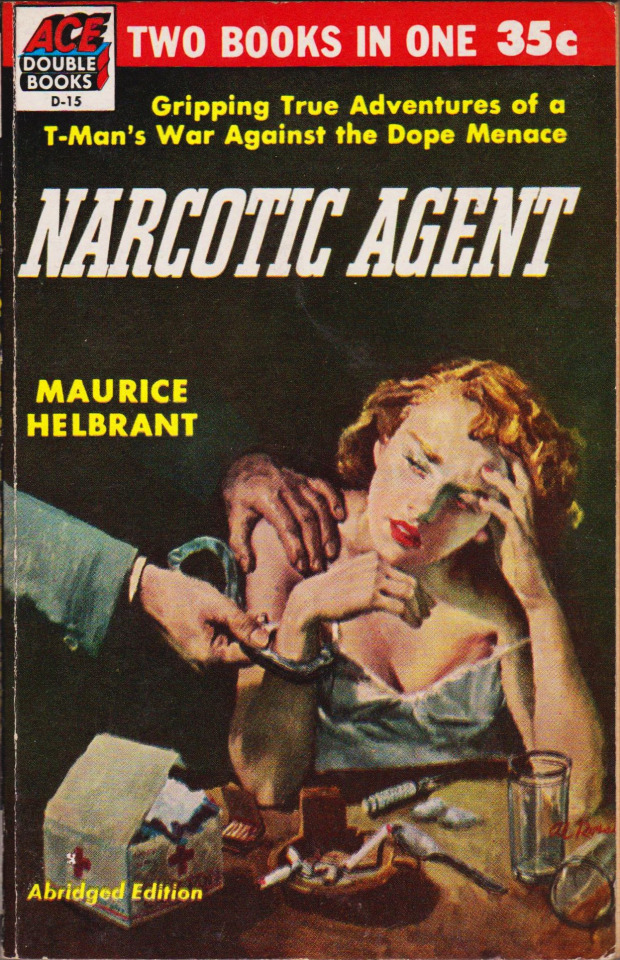
William S. Burroughs first book, published as a paperback original back to back with Narcotic Agent by Maurice Helbrant
#pulp#william s burroughs#narcotic agent#maurice helbrant#ace books#pulp cover#vintage paperbacks#william lee#pseudonym
14 notes
·
View notes
Text
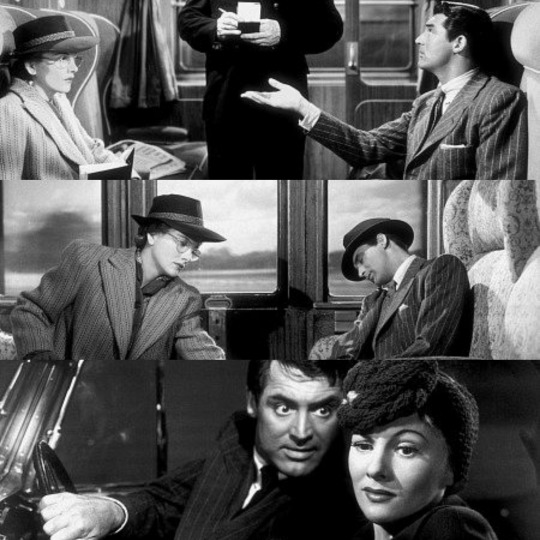
Suspicion (1941, Alfred Hitchcock)
26/01/2024
Suspicion is a 1941 film directed by Alfred Hitchcock.
1938; Seductive playboy Johnnie Aysgarth meets young Lina McLaidlaw on a train in England, coning her to go out with him.
The subject is taken from the novel Before the Fact by Anthony Berkeley Cox, written and published in 1932 under the pseudonym of Francis Iles. RKO had been trying to bring the book to the screen since 1935 and Emily Williams was approached for the screenplay.
Hitchcock hired Samson Raphaelson, a successful collaborator on many of Ernst Lubitsch's film, to write the screenplay.
The part of the male protagonist was entrusted to Cary Grant, in the first of four Hitchcock films he played. The part of the female protagonist was entrusted to Joan Fontaine, in her second film with Hitchcock after Rebecca.
The film was shot entirely in the studio and cost much less than the previous two American films, Rebecca and Foreign Correspondent.
Before the Fact is the story of Lina, who grows up in the countryside in the first decades of the 20th century. Lina and Johnnie spend their honeymoon in Paris, staying in the best hotels and subsequently settle in London, in a large apartment. They leave their expensive London flat and move to Dorset, where they don't know anyone.
In 1943,a group of Italian actors were in Madrid to participate in a Spanish-Italian co-production film, among them Emilio Cigoli, Paola Barbara, Nerio Bernardi, Franco Coop, Anita Farra, Felice Romano; the events of 25 July and 8 September of the same year prevented these actors from returning to Italy.
A representative of 20th Century Fox in Madrid asked the Italian actors, while waiting to return home, to take care of the dubbing of some films of the American company, so that upon the arrival of the Americans in Italy, with the reopening of the cinema market, could be ready for theaters.
#Suspicion#1941#alfred hitchcock#1938#Before the Fact#Anthony Berkeley Cox#Pseudonym#1935#ernst lubitsch#cary grant#joan fontaine#Rebecca#Foreign Correspondent#Noel Simsolo#shadow of a doubt#Éric Rohmer#claude chabrol#20th century#paris#london#dorset#1943#Madrid#Emilio Cigoli#Paola Barbara#Nerio Bernardi#Franco Coop#Anita Farra#Felice Romano#20th centery fox
2 notes
·
View notes
Note
There's so many good writers for my otp I feel like my writing isn't good enough to share
Hi, Nonnie!
I'm a little sad you feel this way, because fandom is all about the word you've already said:
Sharing
Of course your writing is worth sharing!
This is what fandom is for, sharing. You never know who out there is dying to read exactly the sort of fic you've written, and you won't know until you share!
If you're shy about sharing fan content, consider using pseuds and Anon features, give yourself some creative freedom! Using a pseud can be so freeing for writers and artists. Space and freedom to create and post what you desire.
I hope you will, Nonnie! Rooting for you ❣
#99 fandom problems#answered asks#pseudonym#fannish culture#fandom#fanfiction writer#fanfiction#mod lilah
23 notes
·
View notes
Text
Ooohhh this is a fun af theory...
Nils Sjöberg, Willam Bowery, June Bates, now Ellie Conway...
I want to believe it, I really do.
edit: AND DEBUNKED
😂
2 notes
·
View notes
Note
For the ship thing Kanou and Atou ?

i like atou and kanou a lot! i have other pairings that are personally more compelling to me, but they make a lot of sense as a duo and I think theyre cute <3 Pseudonym forever <3. Spoiler talk abt them under the cut (flag events)
i think they're really enjoyable, especially if you go for the kanou flag; I've spoken on this before but it really is fascinating to me. You need to choose to pursue information about kanou, and choose to try to understand him, in order to get those extra scenes. and it's doubly compelling because of the difference in the A/S kanou flag vs the B root flag; Your decisions shape how atou will react to seeing kanou, and it hinges on 'are you going to save shinano'. do you have faith in saving everyone, are you determined, what is your WILL, haruki atou. Save who you want to save. Abandon those you want to abandon. Either way, be resolute and firm in your decisions and your will.
In B root, atou wavers and hesitates and fails to hold true to his Will. And Kanou can't entrust him with HIS will, after that, bc atou doesn't understand him. In A/S root, Atou DOESN'T WAVER. He understands. He is firm in his convictions and his will and kanou is willing to trust him as the only one who will remember Kanou-san.
Also, their dynamic in chapter 4 is so fun and i love the game overs <3 i love the gay sex ending
5 notes
·
View notes